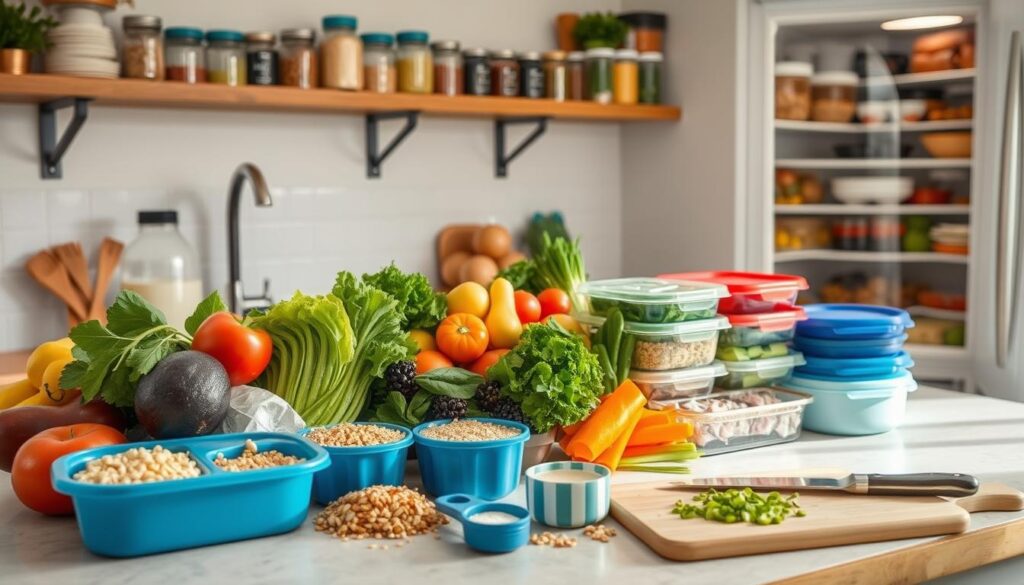Imagine turning your kitchen into a calm meal prep space. Meal prep is more than a trend. It’s a way to save time, reduce stress, and eat healthier.
Getting good at meal prep means planning well and using smart methods. It’s perfect for busy people, parents, or anyone wanting easier cooking. This guide will show you how to cook stress-free and plan meals for the week.
Good meal prep is more than just chopping veggies or cooking a lot at once. It’s about making a plan that lets you enjoy healthy meals all week. You won’t need to spend hours cooking every day.
Key Takeaways
- Develop a consistent meal preparation routine
- Invest in quality storage containers
- Plan meals that can be easily scaled and reheated
- Create a weekly shopping and cooking schedule
- Learn time-saving kitchen techniques
- Prioritize food safety during preparation
Why Meal Prep is Essential for a Balanced Lifestyle
Getting a balanced lifestyle means planning ahead, and meal prep is key. It helps manage your daily food and health. By preparing meals early, you can change your eating habits and improve your life.
Time Management Revolutionized
Meal prep makes time management easier by cutting down cooking stress. Imagine coming home to a healthy meal in no time. This saves you from making last-minute food choices and lets you enjoy other activities.
- Reduces daily cooking time by up to 70%
- Eliminates last-minute meal decisions
- Creates consistent eating schedules
Budget-Friendly Meal Planning
Meal prep can also save you money. Cooking in bulk and choosing ingredients wisely cuts down on food waste and grocery bills.
| Strategy | Potential Savings |
|---|---|
| Bulk ingredient purchasing | 15-25% reduction in food costs |
| Reduced restaurant spending | $100-$250 monthly savings |
Healthy Eating Made Simple
Healthy eating is easy with meal prep. It lets you plan meals that are good for you. You can control how much you eat and avoid unhealthy choices.
“Meal prep is not just about food, it’s about creating a lifestyle that prioritizes your health and wellness.” – Nutrition Expert
A balanced lifestyle begins with careful nutrition. Meal prep helps you manage your diet, save time, and reduce stress. It’s a way to make healthy eating a lasting habit.
Essential Kitchen Tools and Equipment for Successful Meal Prep
Having the right tools in your kitchen can make cooking easy. The secret to a well-organized kitchen is choosing tools that make meal prep simple. These tools should help you work more efficiently.
“The right kitchen gadgets are like trusted companions in your culinary journey” – Professional Chef Sarah Martinez
Here are the top kitchen tools for better meal prep:
- High-Quality Food Processor: Chop, slice, and dice ingredients in seconds
- Reliable Digital Food Scale: Ensure precise portion control
- Multi-Compartment Meal Prep Containers: Keep ingredients separated and fresh
- Sharp Chef’s Knife: The cornerstone of efficient meal preparation
- Instant Pot or Multicooker: Cook multiple dishes simultaneously
Buying these gadgets saves time and changes how you cook. Both professional chefs and home cooks know that good tools are key to easy meal prep.
Other important tools include measuring cups, silicone baking mats, glass mixing bowls, and airtight containers. Each one helps keep your kitchen organized and efficient.
“Meal prep is 50% preparation and 50% having the right tools” – Nutrition Expert Mark Rodriguez
Smart Storage Solutions for Organized Meal Preparation
Effective food storage is key to successful meal prep. An organized kitchen system helps you use space well, keep food fresh, and make meal prep easier.
Best Food Storage Containers
Choosing the right meal prep containers can change your kitchen. Look for these important features:
- Leak-proof seals
- Microwave and dishwasher safe
- Clear material for easy visibility
- Stackable design
- Graduated sizes for versatile storage
Refrigerator Organization Tips
Make your fridge more organized with smart placement and sorting:
- Group similar ingredients together
- Use clear containers for quick identification
- Label containers with preparation dates
- Keep raw meats on bottom shelves
“A well-organized refrigerator saves time and reduces food waste.” – Professional Chef
Freezer Storage Guidelines
Proper freezer storage keeps food fresh longer. Use these tips:
- Freeze meals in portion-controlled containers
- Remove excess air to prevent freezer burn
- Use freezer-safe labels
- Rotate older meals to front for quick use
Using these food storage tips will make meal prep faster and less stressful.
Creating Your Weekly Meal Planning Schedule
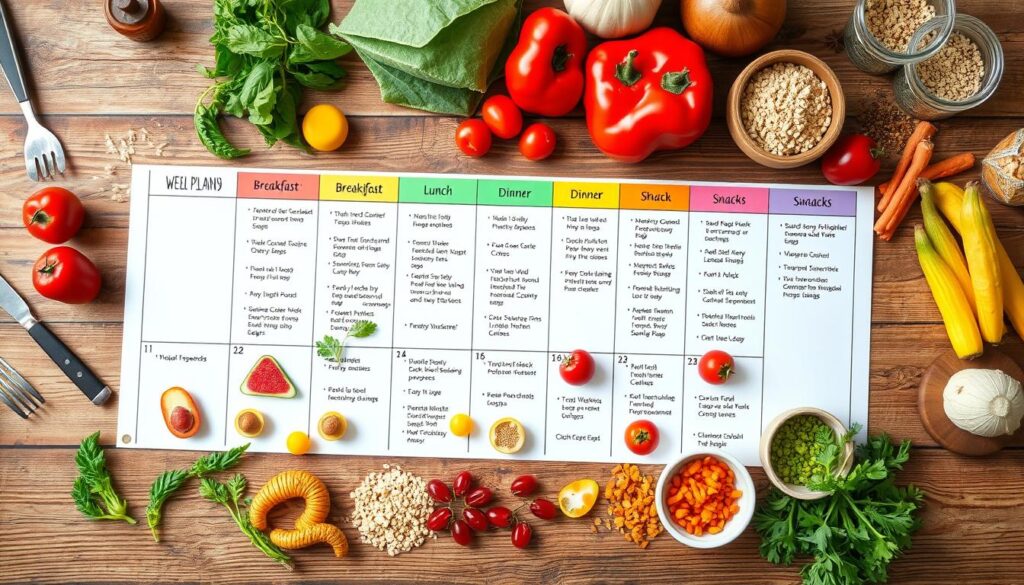
Creating a weekly meal plan can make your kitchen a peaceful place. It’s not just about picking what to eat. It’s about setting up a system that saves time, lowers stress, and keeps your diet healthy.
“A well-planned menu is the cornerstone of healthy eating and efficient kitchen management.”
Begin by making a detailed weekly schedule. Here are some tips for making a good meal plan:
- Think about your weekly plans and how much time you have to cook
- Make sure to include a mix of protein, veggies, and carbs
- Choose recipes that can be easily changed up
- Have theme nights to make planning easier
By planning your meals wisely, you can:
- Waste less food
- Save money on groceries
- Make fewer decisions each day
- Eat more consistently
| Day | Meal Type | Preparation Time |
|---|---|---|
| Monday | Batch Protein Prep | 45 minutes |
| Tuesday | Quick Weeknight Meals | 30 minutes |
| Wednesday | Slow Cooker Recipes | 15 minutes prep |
| Thursday | One-Pot Dishes | 40 minutes |
| Friday | Flexible Leftovers | 20 minutes |
Pro tip: Flexibility is key in meal planning. Create a framework that works for your lifestyle, not against it.
The Ultimate Meal Prep Checklist: Stay Organized and Stress-Free
Mastering meal prep can change your weekly cooking from chaotic to controlled. A good plan for kitchen organization saves time, lowers stress, and makes sure you have tasty meals all week.
Good meal prep needs careful planning and doing. Let’s look at the key steps for a smooth cooking schedule that fits your life.
Kitchen Preparation Steps
- Clean and sanitize all work surfaces
- Gather necessary cooking tools and equipment
- Check inventory of spices and basic ingredients
- Ensure proper food storage containers are clean and ready
Grocery Shopping Guidelines
Making a good grocery list is key for efficient meal prep. Here are some tips:
- Plan meals in advance
- Check pantry before shopping
- Buy versatile ingredients
- Purchase fresh produce strategically
Cooking Timeline Management
Make your cooking schedule better with these tips:
“Preparation is the key to stress-free meal planning” – Culinary Experts
- Batch cook proteins and grains
- Chop vegetables in advance
- Use slow cooker or instant pot for efficient cooking
- Allocate specific time blocks for meal preparation
Pro tip: Invest in quality meal prep containers and label everything with preparation dates to maximize food safety and organization.
Batch Cooking Strategies for Maximum Efficiency
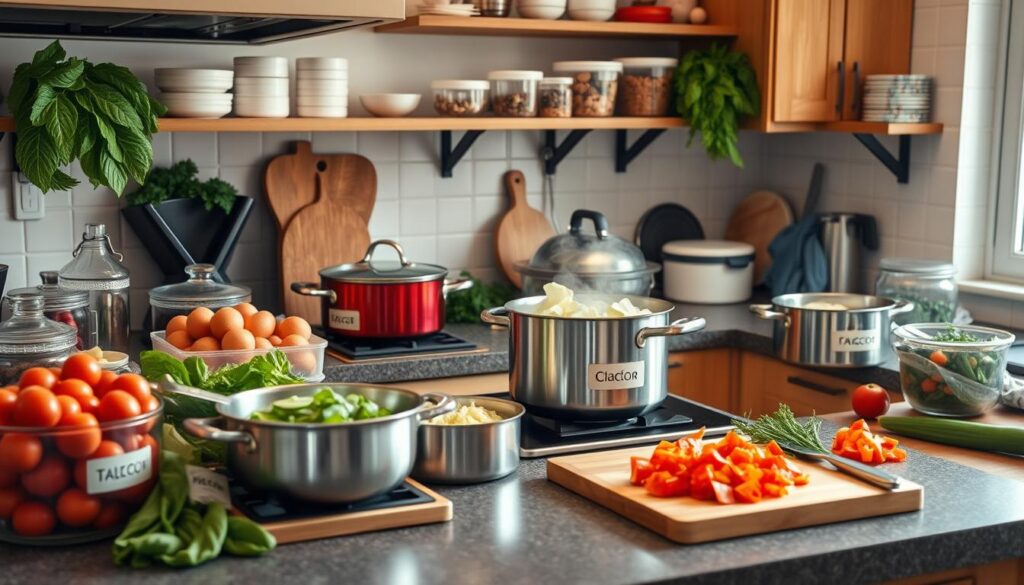
Learning batch cooking can change how you prepare meals. It turns cooking into an art, letting you make many meals at once. This way, you save a lot of time and always have healthy food ready.
“Batch cooking isn’t just about saving time – it’s about reclaiming your kitchen and enjoying stress-free meals throughout the week.”
Here are some ways to make meal prep more efficient:
- Choose versatile ingredients that work across multiple recipes
- Invest in high-quality storage containers
- Plan your cooking session with precise timing
- Cook protein sources in large quantities
- Utilize kitchen appliances like slow cookers and instant pots
Good batch cooking needs careful planning. Find recipes that keep their flavor when reheated. Foods like chicken, beef, and beans are great for making in bulk. You can also prep grains, roasted veggies, and basic sauces ahead of time.
Using smart batch cooking methods can make meal prep easier and faster. By spending a few hours each week on meal prep, you’ll change how you see cooking and eating.
Food Safety Guidelines for Meal Prepping
Keeping food safe during meal prep is key to staying healthy and avoiding foodborne illnesses. Good food safety habits make sure your meals stay safe and tasty from start to finish.
Meal prep hygiene is more than just cooking. It’s about knowing how to store and handle food safely. This keeps your meals healthy and free from risks.
Proper Food Storage Temperatures
Keeping food at the right temperature is vital for safety. Bacteria grow fast between 40°F and 140°F, known as the “danger zone”.
- Refrigerate perishable foods within 2 hours
- Keep refrigerator temperature at or below 40°F
- Freeze foods at 0°F to prevent bacterial growth
Safe Handling Practices
Using strict food handling methods helps avoid contamination during meal prep.
- Wash hands thoroughly before and after handling food
- Use separate cutting boards for raw meats and vegetables
- Cook foods to recommended internal temperatures
Expiration Date Management
Knowing food expiration dates is crucial to avoid eating unsafe meals.
“When in doubt, throw it out” – A golden rule of food safety
- Check labels for “use by” and “best before” dates
- Store prepped meals in clear, dated containers
- Consume refrigerated meals within 3-4 days
Following these food safety tips ensures you enjoy healthy, tasty meal prep while reducing health risks.
Budget-Friendly Meal Prep Ideas
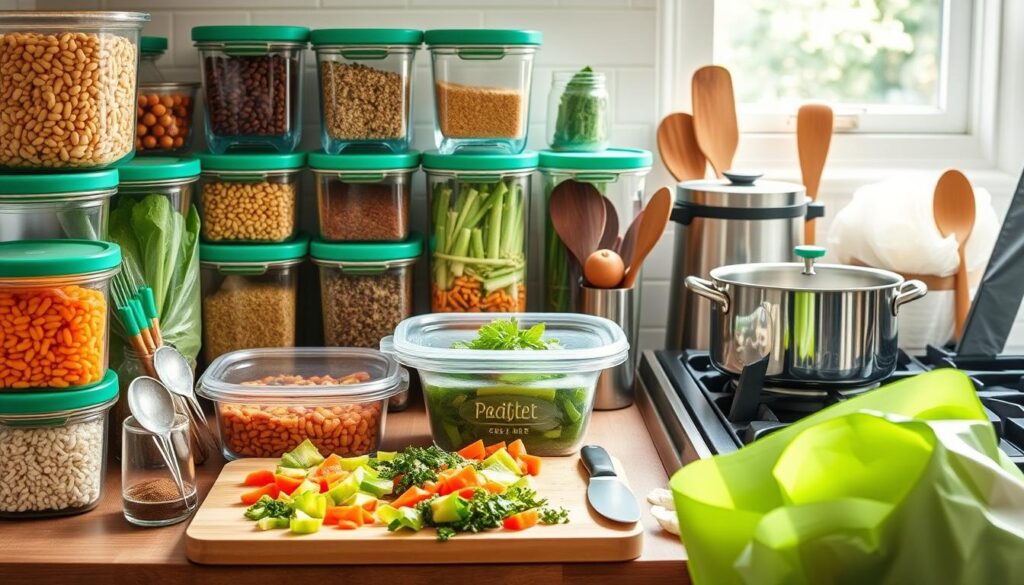
Mastering affordable meal prep doesn’t mean you have to give up taste or health. By planning smart and shopping wisely, you can make your meals both tasty and affordable.
“Eating well on a budget is an art of creativity and intelligent choices.” – Culinary Expert
To prep meals on a budget, learn to pick cheap ingredients and stretch your grocery dollars. Start with versatile, healthy foods that can be used in many dishes.
- Choose protein sources like beans, eggs, and chicken thighs
- Buy seasonal produce for lower prices
- Purchase bulk grains and legumes
- Utilize frozen vegetables for cost-effective cooking
Cost-effective cooking needs a smart plan and shopping tricks.
| Ingredient | Average Cost | Meal Potential |
|---|---|---|
| Dried Beans | $1.50/pound | 3-4 meals |
| Chicken Thighs | $2.50/pound | 2-3 meals |
| Brown Rice | $1.00/pound | 4-5 meals |
Pro tip: Always compare prices, use store loyalty programs, and consider generic brands to maximize your affordable meal prep strategy.
With careful planning and creative cooking, you can turn budget limits into chances for tasty, healthy meals.
Time-Saving Meal Prep Hacks and Tips
Mastering meal prep means using smart strategies to work smarter, not harder. It’s about making your kitchen more efficient and saving time. Home cooks who are good at meal prep know it’s not just about cooking.
Streamlining your meal prep can make cooking much easier. Let’s look at some meal prep hacks that will change how you cook. These tips will make your cooking faster and less stressful.
Quick Preparation Techniques
- Invest in multipurpose kitchen tools that save time and reduce cleanup
- Chop vegetables in bulk at the start of the week
- Use sheet pan and one-pot recipes for minimal cooking effort
- Prep ingredients while waiting for water to boil or oven to preheat
Multi-Tasking Strategies
Effective multi-tasking is key for kitchen efficiency. Professional chefs suggest these tips:
- Start with recipes that have overlapping cooking times
- Utilize different cooking appliances simultaneously
- Prepare marinades and sauces while proteins are cooking
Cleanup Efficiency Tips
Cleaning up quickly is as important as cooking fast. Here are some quick cleanup tips:
| Strategy | Time Saved |
|---|---|
| Clean as you cook | 15-20 minutes |
| Use parchment paper for easy pan cleanup | 10-15 minutes |
| Have trash bowl nearby during prep | 5-10 minutes |
“The secret of getting ahead is getting started.” – Mark Twain
By using these meal prep hacks, you’ll make your kitchen more efficient. This will save you time and reduce stress while cooking.
Common Meal Prep Mistakes to Avoid
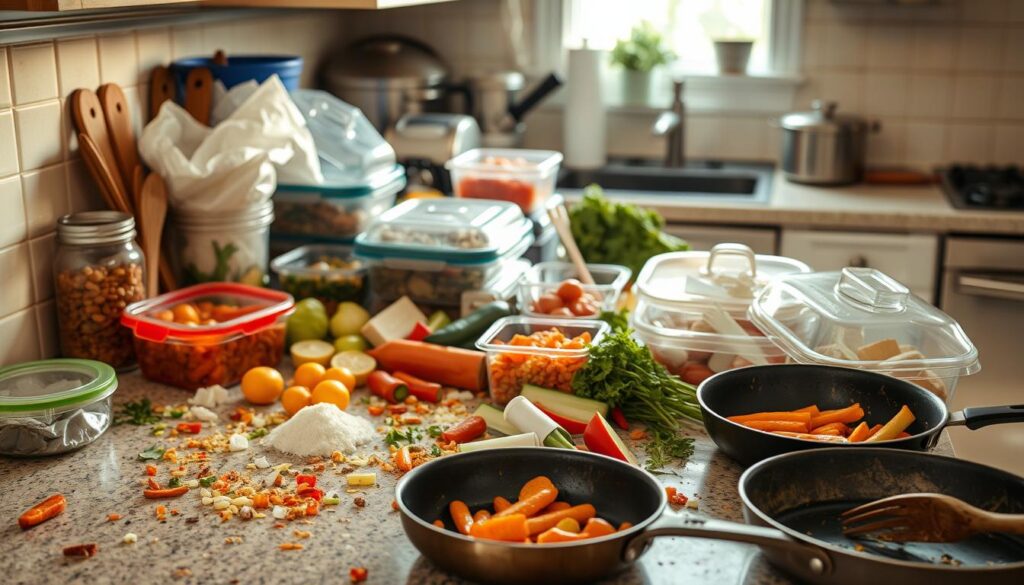
Meal prep can be tricky, and many home cooks make mistakes. These mistakes can ruin their nutrition and budget plans. Knowing these mistakes is the first step to better meal planning.
Let’s look at the most common meal prep errors that can ruin your healthy eating plans:
- Overbuying Ingredients: Buying too much food leads to waste and extra spending. Plan your meals well and only buy what you’ll use.
- Poor Portion Control: Making too much food can lead to eating too much or throwing away leftovers. Use measuring tools and recipe guidelines for the right sizes.
- Lack of Variety: Eating the same meals all the time can get boring and lack nutrients. Try new recipes and explore different cuisines.
“Successful meal prep is about strategic planning, not perfection.” – Nutrition Expert
More meal planning challenges include:
- Neglecting Food Safety: Always keep meals at the right temperature and eat them within the time suggested.
- Inadequate Container Selection: Use containers that are leak-proof, microwave-safe, and keep food fresh.
- Improper Seasoning and Flavor Management: Prepare basic ingredients that can be seasoned differently each week.
By knowing these common mistakes, you can make meal prep better. It will support your health and lifestyle goals.
Seasonal Meal Prep Adjustments
Seasonal cooking turns meal prep into a fun journey. As the weather and daylight change, so should your meal prep. This keeps your meals fresh and relevant.
“Eating seasonally isn’t just about flavor—it’s about nourishing your body with the right nutrients at the right time.” – Nutrition Expert
Choosing meals that match the weather is key. In winter, warm dishes with root veggies and squash are perfect. Summer calls for light, cool meals to keep you hydrated.
- Winter: Focus on nutrient-dense, warming meals
- Spring: Incorporate fresh, green seasonal produce
- Summer: Prioritize light, hydrating meal prep
- Autumn: Embrace comfort foods with seasonal harvest
Adapting your meal prep to the seasons is easy. Use these tips to improve your meal prep all year round.
| Season | Key Ingredients | Meal Prep Focus |
|---|---|---|
| Winter | Squash, Kale, Potatoes | Batch soups, stews |
| Spring | Asparagus, Peas, Radishes | Light salads, grain bowls |
| Summer | Tomatoes, Berries, Zucchini | Cold meals, grilling |
| Autumn | Apples, Pumpkin, Brussels Sprouts | Roasted vegetables, casseroles |
Pro tip: Invest in versatile storage containers that can handle temperature variations and keep your seasonal meal prep organized and fresh.
Conclusion
Meal prep is more than just cooking. It’s a way to change your life. By using organized cooking methods, you’ll find many benefits. These benefits include saving time, feeling less stressed, and living a healthier life.
Starting meal prep takes effort and patience. Begin with small steps and try new things. Use good storage containers, plan your meals, and cook with purpose. Every step you take makes your life better.
Your kitchen can be a place of health and productivity. Learning meal prep skills gives you more than just food. It gives you a way to take care of yourself every day. Remember, being consistent is important. Small changes can make a big difference in your life and health.
Take on this new way of meal planning. With hard work and the right methods, you’ll make cooking easier and less stressful. Your future self will thank you for this organized and healthy lifestyle.
FAQ
What are the main benefits of meal prepping?
Meal prepping saves time and reduces stress. It helps control portion sizes and promotes healthier eating. It also cuts down on food expenses. By planning meals ahead, you avoid last-minute choices.
How long can I safely store meal-prepped food?
You can store most meal-prepped foods in the fridge for 3-5 days. Keep proteins, grains, and veggies separate. Use airtight containers and refrigerate at 40°F or below to prevent bacterial growth.
What are the best containers for meal prep?
Look for containers that are microwave-safe, leak-proof, and BPA-free. Glass containers with compartments are great for keeping foods separate. Stackable plastic containers with secure lids save space and keep meals fresh.
Can I freeze meal-prepped food?
Yes, many meals can be frozen for 2-3 months. Proteins, grains, and most veggies freeze well. Avoid freezing wet foods like salads. Use freezer-safe containers and label them with the date.
How do I prevent my meal-prepped food from becoming soggy?
Store wet and dry ingredients separately. Use containers with compartments. Add sauces or dressings just before eating. Keep crispy elements in a separate compartment. Reheat meals properly to keep them fresh.
Is meal prepping expensive?
Meal prepping can save money by reducing impulse buys and food waste. Choose affordable proteins like chicken, beans, and eggs. Plan meals around seasonal, cheap produce.
How much time does meal prepping typically take?
Meal prep usually takes 2-4 hours on a weekend. As you get better, you’ll prep faster. Start with simple recipes and add more as you gain experience.
Can I meal prep if I have dietary restrictions?
Absolutely! Meal prepping works for many diets, including vegetarian, vegan, gluten-free, keto, and paleo. Focus on whole ingredients and plan carefully. Choose recipes that fit your dietary needs.
What kitchen tools are essential for meal prepping?
You’ll need good knives, cutting boards, measuring cups, and containers. A slow cooker or instant pot, baking sheets, and a digital food scale are also key. Quality tools make meal prep easier.
How can I add variety to my meal prep routine?
Mix things up by trying new recipes and cuisines. Use different spices and marinades. Prepare versatile ingredients that can be used in many meals. Try new proteins and veggies to keep things interesting.

